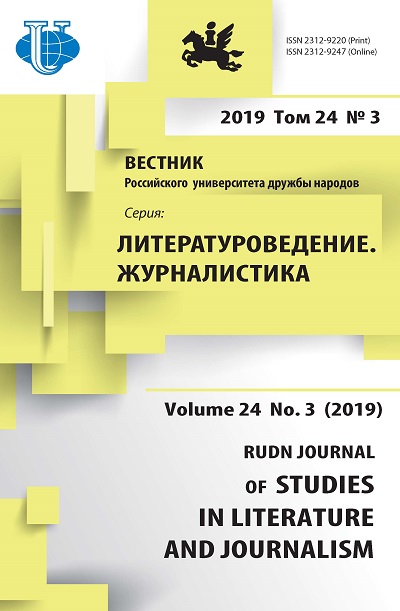Интервью-конфронтация в структуре современного аудиовизуального произведения
- Авторы: Шестерина А.М.1
-
Учреждения:
- Воронежский государственный университет
- Выпуск: Том 24, № 3 (2019)
- Страницы: 511-520
- Раздел: Журналистика
- URL: https://journals.rudn.ru/literary-criticism/article/view/22345
- DOI: https://doi.org/10.22363/2312-9220-2019-24-3-511-520
- ID: 22345
Цитировать
Полный текст
Аннотация
Статья посвящена анализу актуальной на современном телевидении и в сетевой среде форме диалоговой коммуникации - интервью-конфронтации. На материале анализа популярных передач ТВ и YouTube, основанных на этом типе интервью, определяется жанровое своеобразие, функциональные и композиционные особенности, специфика вопросов. С опорой на метод анализа контента, сравнительно-типологический и историкофункциональный методы делаются выводы о широкой представленности интервью-конфронтации как на традиционном ТВ, так и в структуре сетевого видеоблогинга. Подчеркивается, что особенность анонсирования темы в интервью заключается в фиксации негативного отношения ведущего к позиции респондента, что находит отражение и в основной части в конфронтационных, конкретизирующих, программирующих, провокационных и других формах вопросов.
Ключевые слова
Об авторах
Алла Михайловна Шестерина
Воронежский государственный университет
Автор, ответственный за переписку.
Email: shesterina8@gmail.com
доктор филологических наук, профессор кафедры телевизионной и радиожурналистики Воронежского государственного университета
Российская Федерация, 394068, Воронеж, ул. Хользунова, 40АСписок литературы
- Березин В.М., Волкова И.И., Грабельников А.А. Экранная коммуникация в современном информационном обществе. М.: РУДН, 2008. 347 с.
- Ильченко С.Н., Окнер О.А. Телевидение в эпоху интернета. СПб., 2005. 106 с.
- Мультимедийная журналистика / под ред. А.Г. Качкаевой, С.А. Шомовой М.: Издательский дом Высшей школы экономики, 2017. 413 с.
- Цвик В.Л. Телевизионная журналистика: история, теория, практика М.: Аспект Пресс, 2004. 382 с.
- Terrace V. Encyclopedia of Television Shows, 1925 through 2010. 2nd edition. London: McFarland, 2011.
- Шестерина А.М. Полемический текст в современном медиапространстве (функциональные, жанровые и структурные особенности печатной полемики). Тамбов: Изд-во ТГУ имени Г.Р. Державина, 2003. 302 с.
- Шестерина А.М. Полемический текст в современной российской прессе // Вестник Московского университета. Серия 10. Журналистика. 2004. № 1. С. 120-134.
- Аносова С.В. Агрессия и формы ее воплощения в полемических текстах региональных изданий // Вестник Воронежского университета. Серия: Филология и журналистика. 2008. № 1. С. 165-174.
- Синенко Т.В. Полемика в Рунете: функциональные, структурные, тематические и жанровые особенности: автореферат дис.. канд. филол. наук. Воронеж, 2008. 22 с.
- Dzyaloshinsky I., Dzyaloshinskaya M. Violations of the journalist ethics: professional negligence or a pattern? // World of Media. 2017. No. 1. Pp. 200-228.
- Сандлер Л.Л. Интервью-конфронтация как способ коммуникативного взаимодействия в программе «Познер» // Век информации. 2017. Т. 2. № 2. С. 56-58.
- Прозоров В.В. Журналистское образование и филология: продолжение союза или намечающийся развод? // Известия Саратовского университета. Серия: Филология и журналистика. 2012. № 2. С. 94-99.
Дополнительные файлы















